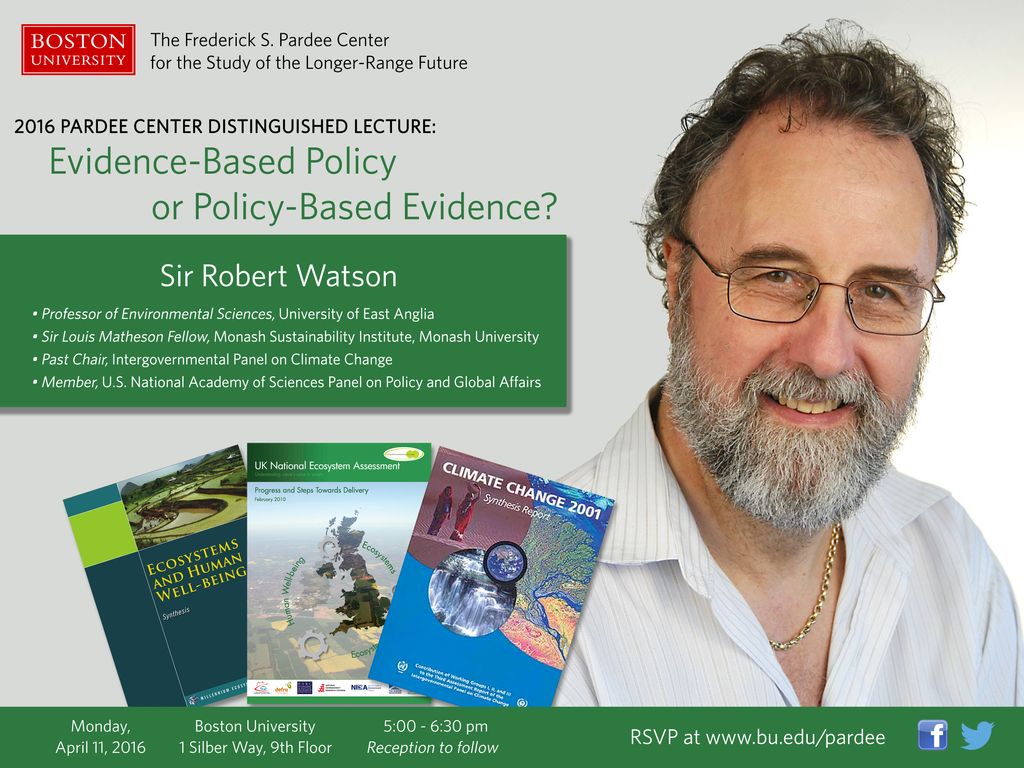Robert Watson to Deliver 2016 Pardee Center Distinguished Lecture
The Frederick S. Pardee Center for the Study of the Longer-Range Future at Boston University invites you to attend its 2016 Distinguished Lecture, “Evidence-Based Policy or Policy-Based Evidence?” featuring Sir Robert Watson on Monday, April 11 from 5:00 – 6:30 pm (reception to follow) at the Metcalf Trustee Center at 1 Silber Way, 9th Floor.
In his lecture, Prof. Watson will discuss how national and international policies have been informed by scientific (including social and economic) evidence, e.g. stratospheric ozone depletion, loss of biodiversity and degradation of ecosystems and their services, and even climate change, and the important role of national and international assessments. But even in these cases, the policymakers demanded almost irrefutable evidence before acting. So the question is how much evidence should policymakers need before taking action, given the inertia, and potential irreversibility, of natural systems. Should policymakers take into account the precautionary principle, and if so, how?
Biography
Sir Robert Tony Watson is a widely recognized leader of national and international scientific, technical, and economic assessments on topics ranging from stratospheric ozone depletion to biodiversity to climate change to agriculture and development. A key participant in many of the most important and commonly cited scientific assessments of the past four decades, he is a leading authority on the interface between science and policy.
With a doctorate in atmospheric chemistry, he was a program manager/director at the U.S. National Aeronautics and Space Administration (NASA) early in his career, and went on to serve as a chief scientist and/or science advisor at the highest levels of government in both the United Kingdom and the United States, as well as at the World Bank. He chaired the Intergovernmental Panel on Climate Change (IPCC) from 1997 to 2002, overseeing publication of the organization’s Third Assessment Report in 2001, laying the groundwork for the Nobel Prize awarded to the IPCC six years later. Since 2007, he has held appointments as a Professor of Environmental Sciences and strategic director for the Tyndall Center at the University of East Anglia, UK, and as Sir Louis Matheson Fellow, Monash Sustainability Institute (MSI), Monash University, Melbourne, Australia.
Prof. Watson has received numerous awards and honors, including the British Ecological Society Ecological Engagement Award (2015), the United Nations’ Champion of the World for Science and Innovation (2014), the Asahi Glass Blue Planet Prize (2010), and the American Association for the Advancement of Science Award for International Scientific Cooperation (2008). In addition, he is a Fellow of the Royal Society (UK) and has received the highest honors of the United Kingdom, recognized as a Knights Bachelor in 2012 and a Companion of the Order of Saint Michael and Saint George in 2003.
His full curriculum vitae is available here.
